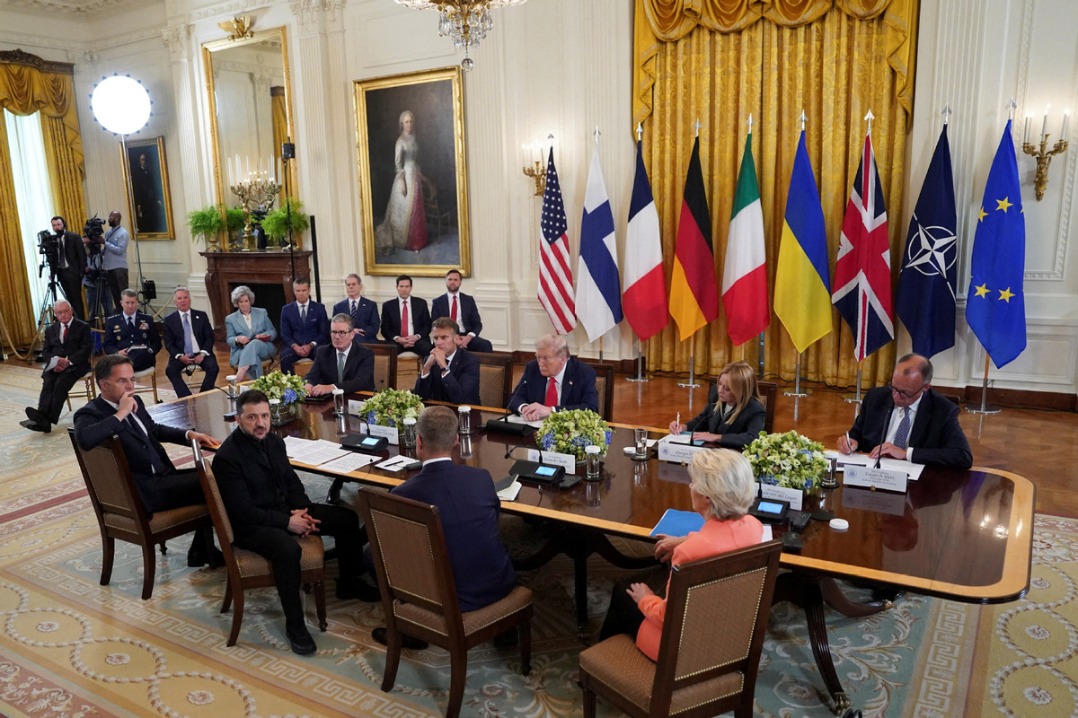Tariffs will ultimately harm US economy


That Vice-Premier Liu He talked with US Trade Representative Robert Lighthizer and US Treasury Secretary Steven Mnuchin on the phone on Monday raises hope that China and the United States would resume the bilateral trade negotiations.
However, the negotiations, if they resume, are not likely to be smooth. On June 18, Lighthizer threatened to impose punitive tariffs on Chinese imports if certain issues were not resolved to the US' satisfaction.
The US has been constantly pressuring China and has slapped 25 percent tariffs on about $250 billion of Chinese goods even though US President Donald Trump called President Xi Jinping on the phone recently and said that he would restart the trade negotiations on the sidelines of the G20 Summit in Osaka, Japan, later this week.
US trade war hawks believe Washington can win the tussle with Beijing because they either indulge in self-deception or are ignorant enough to gloss over the US' loss in the trade war it has started. In March last year, the White House claimed it is easy to win a trade war, with the US administration stressing that a trade war will deal a serious blow to the Chinese economy despite basic economic principles and scientific data analysis suggesting otherwise.
US consumers forced to pay more for goods
Theoretically speaking, the distribution of tariff cost depends on the relative value of US consumers' demand elasticity to the supply elasticity of vendors that export to the US. The lesser the demand elasticity and greater the supply elasticity, the higher the cost of tariff the US is expected to pay.
Independent studies conducted by multiple scholars in the US show the tariffs would increase the price US consumers pay for a product while the supply price of Chinese vendors remains nearly unaffected. The Chinese Academy of Social Sciences, too, has said that more than 90 percent of the tariffs would have to be paid by the US. And an International Monetary Fund report, issued in May, indicated the US would shoulder most of the cost of the tariff hike.
The tariff hike would also deal a blow to the US economy and welfare. According to the US National Bureau of Economic Research, the welfare loss on the consumers' and producers' side due to the 2018 tariff policy would total 0.37 percent of GDP, while the Center for Economic and Policy Research, a Washington-based economic policy think tank, predicted the tariff policy would cause a monthly loss of $1.4 billion to the US.
Thanks to the negative effects of the trade disputes with multiple countries, the US did not achieve the expected GDP growth rate of 3 percent in 2018.
Some in US fantasizing about 'winning' trade war
The US' unexpected 3.2 percent GDP growth in the first quarter this year might have prompted certain people including politicians to fantasize that Washington is "winning" the trade war. Yet the temporary recovery of the US economy can be attributed to a series of economic stimulus, including tax reduction and increase in public spending, which for the time being appears to offset the negative influences of the trade war on the US economy.
The fact is, the US could have registered a much higher growth rate had it not launched a trade war against China. That institutions including JPMorgan Chase and Goldman Sachs have all lowered the forecasts for US growth suggests their White House has squandered the chance to bolster US economic growth by imposing punitive tariffs on imports, especially from China.
A simulation test conducted by the Chinese Academy of Social Sciences shows the US would lose 0.004 percent of GDP for hiking tariffs and 0.067 percent of GDP because of China's countermeasures. Also, the US' manufacturing sector employment would decline by 0.652 percent due to the 25 percent tariffs it has imposed on Chinese goods and another 0.907 percent due to China's countermeasures. Which means the tariff hike will harm American people's livelihoods.
US daydreaming that it can win trade war
The US administration is free to use its imaginary achievements to beat its chest, but it must be daydreaming to believe it can win the trade war. At the very least, the US' huge economic loss would make the trade war a bad bargain even if it succeeded in realizing some of its objectives. According to scholars including Mary Amiti, assistant vice-president of the Federal Reserve Bank of New York, even if a trade negotiation increases the royalties China pays to the US by 25 percent, it would take three years of these higher royalties to cancel out the deadweight welfare loss caused by the US-triggered trade war.
On the other hand, even if the trade war helps create 35,400 manufacturing jobs-the number of steel and aluminum sector jobs lost in the last 10 years-the deadweight welfare loss per job saved would be $195,000, which is almost four times the average annual wage of a steel worker: $52,500.
Since the US first slapped punitive tariffs on Chinese goods in 2018, their full impact on global trade is not yet known. And although Chinese enterprises couldn't immediately find substitute trade partners, they will certainly achieve a smooth transfer of production and trade with the passage of time. For instance, Harley Davidson, once hailed by the White House as a model of "Made in America", has shifted part of its production unit and even started cooperation with Qianjiang Motorcycle to produce motorbikes in China. The trade protectionism policy that the US administration claimed would create jobs for Americans is instead bringing quality investment to China.
In the short term, the US can neither claim victory in the trade war nor say China alone is paying the hiked tariffs. And in the long run, at a time when developed economies are struggling to boost growth, and populism and protectionism are rising, the US, rather than making its due contribution to improve the global economy, is continuing to intensify Sino-US disputes. And by so doing, the US is soiling its global image and overdrawing on its long-term global competitiveness.
Dong Yan is a research fellow at the Institute of World Economics and Politics, Chinese Academy of Social Sciences. And Zang Chengwei is a postdoctoral scholar at the same institute. The views don't necessarily represent those of China Daily.


































